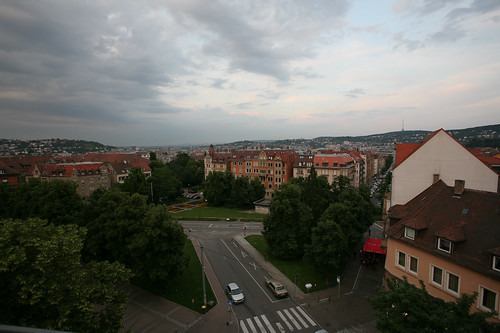 Memory is really strange. On the one hand, I’m amazed at how fast the last three years of my life has gone by. I remember walking into my hotel room on the day I landed in Stuttgart, a full month before Rebecca would come, and putting down my bags and really wondering what I had gotten myself into. I had decided to take a job in a city I had visited only during my interviews, in a country I had only spent a few days in as a tourist, and here I am sitting down in my hotel room, in need of a shower, exhausted from jet-lag, only then grasping that I had committed myself and Rebecca to living in Stuttgart for at least three years. At that moment I could only hope that we had made the right choice to come. It turned out to be one of the best decisions of our lives.
Memory is really strange. On the one hand, I’m amazed at how fast the last three years of my life has gone by. I remember walking into my hotel room on the day I landed in Stuttgart, a full month before Rebecca would come, and putting down my bags and really wondering what I had gotten myself into. I had decided to take a job in a city I had visited only during my interviews, in a country I had only spent a few days in as a tourist, and here I am sitting down in my hotel room, in need of a shower, exhausted from jet-lag, only then grasping that I had committed myself and Rebecca to living in Stuttgart for at least three years. At that moment I could only hope that we had made the right choice to come. It turned out to be one of the best decisions of our lives.
Remembering specific events, though, and time doesn’t seem to move so quickly. I think about my first weekend in Germany, when a colleague invited me to an Onion Festival in the medieval town of Esslingen, and it seems appropriately placed about three years ago. Then I remember when our friend Laurel visited, our first visitor, I think, and how we went out to a besenwirtschaft (a uniquely south-west Germany gem, in which vineyard-owning families sell their own wine out of their living rooms) and got extremely intoxicated with a super friendly German couple. We ended up getting invited to their home for a few more bottles of wine, and Rebecca got sick in their bathroom just as our taxi pulled up. I remember all of the festivals - the Hamburg Fischmarkt, Karnival, the Weindorf, and of course the Bierfests (Germans love to find a reason, any reason, to have a festival). I remember all our visitors - our families and lots of friends from home - who took advantage of us living in Stuttgart and allowed us to share our newly found love of Germany with them. I think fondly of all the trips we took - the Turin Winter Olympics, Sardinia, the Lake District, Poland, and so many more. The more memories I conjure up and place into a mental timeline, the more it seems like it really has been three, full, years since I stepped into my room at the Millennium Hotel, and I’m both at once happy for the experience and sad that I can no longer call Stuttgart home, even if it means I no longer have to walk up 6 flights of stairs to be home.
We hope to go 2 for 2 on picking cities randomly and moving without any prior connection, and so far Austin has really been a great place. Many great things about German culture are embraced in Austin - love for the outdoors and festivals being the two most obvious. There are even biergartens, and the town of Fredricksburg, located in the center of Texas wine country (another huge similarity to Stuttgart!), was founded by Germans, and I think the German influence on the local culture shows. There’s even a local waterpark called the Schlitterbahn.
I think we’re off to a good start.
